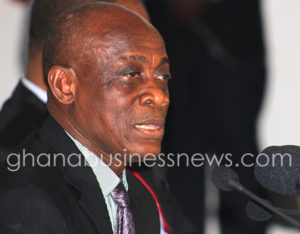Ghana government asked to control spending in run-up to elections

The Institute for Statistical, Social and Economic Research (ISSER) has launched the 25th edition of its State of the Ghanaian Economy Report, 2015.
The launch was made with a call on government to tightly control its spending in the run-up to December 7 elections.
Professor Felix Asante, Director of ISSER, presenting highlights of the SGER 2015 said there is the need for considerable political discipline to prioritise public finances in light of the high government debt, which rose from 36 per cent in 2009 to 73 per cent of Gross Domestic Product (GDP) in 2015.
“It is very important that we remain firm in our commitment not to get carried away by the pressure to spend,” he said.
He said while the International Monetary Fund had projected an increase in GDP to 4.5 per cent in 2015 from 3.9 per cent in 2015, largely fuelled by the assumptions that energy challenges has been resolved, limitations in infrastructure and labour markets as well as declining commodity prices would slowdown momentum in growth.
He explained that while the energy challenge has been largely resolved, it would take some time for businesses affected to regain their momentum and to start production.
According to the SGER 2015, the decrease in GDP growth in 2015 from 4.0 per cent in 2014 reflected global economic performance and continued the downward trend since 2011.
However, non-oil GDP growth at 4.1 per cent, outpaced overall GDP growth; 3.9 per cent, for the first time since 2011, bringing into question the impact of the oil and gas sector on the economy.
The service sector remains the main driver in 2015 with a growth rate of 5.7 per cent, followed by industry at 1.2 per cent and agriculture at 2.4 per cent.
Real per capita GDP growth however fell from 1.4 per cent in 2014 to 0.9 per cent in 2015, while inflation remained above the target rate at 17.5 per cent.
On the fiscal front, the report noted that the overall budget deficit declined to GH₵ 9,586 million representing 6.9 per cent of GDP from 9.7 in 2014 while government revenue as a percentage of GDP increased from 21.3 to 22.9 per cent in 2015.
“Ghana’s trade continued its 2014 downturn with contractions in both imports and exports,” the report also said.
Prof Ebenezer Oduro-Owusu, Vice Chancellor of the University of Ghana, who chaired the launch commended ISSER for the continued production of the SGER, saying it demonstrates the University’s value of helping to build a strong and prosperous nation through knowledge generation and impartation, culminating in the development of a stimulating knowledge economy.
He noted that Ghanaians have had to endure varying accounts of the state of Ghana’s economy by different stakeholders.
Prof Oduro-Owusu noted that knowledge of the economic statues of one’s country is important and should not be left to chance.
“Discussions must be nation-centred, politically neutral and dispassionate for the good of the future of this noble country,” he stated.
He said the media play a critical role in this, especially with regard to the calibre of people they call for discussions on national economic issues.
“I will like to urge the media to help set agenda for meaningful conversations and debates on Ghana’s economy,” he stressed.
Source: GNA
